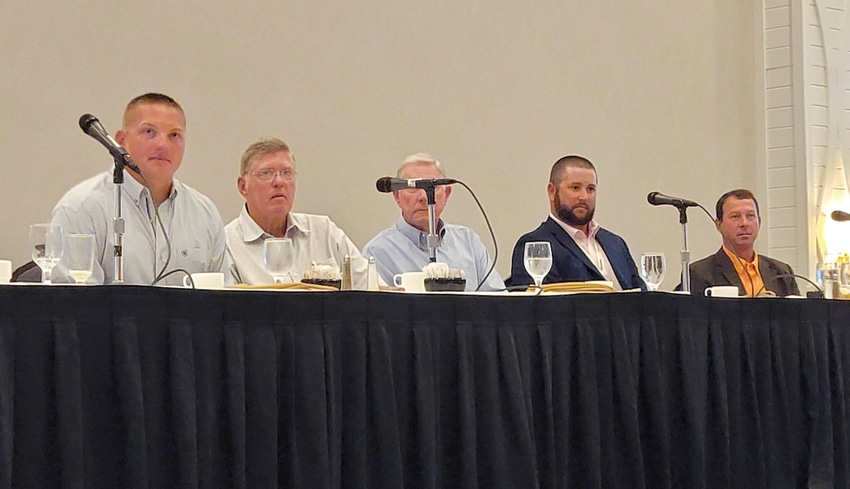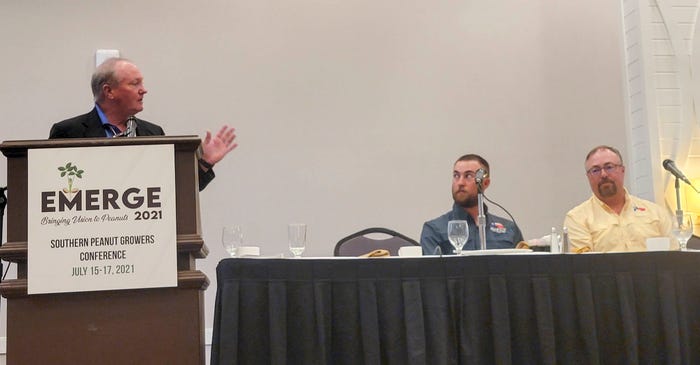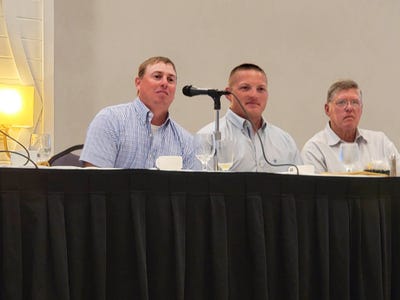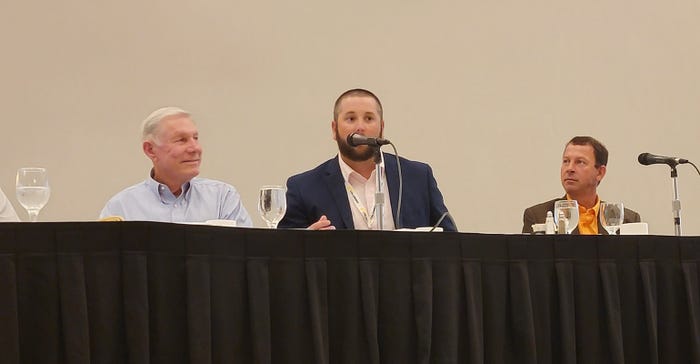
Too much water in Alabama and not enough water in Texas, labor challenges, and leaving the farm to the next generation were all concerns raised during a question and answer panel at this year’s Farm Press Peanut Efficiency Award Breakfast at the Southern Peanut Growers Conference in Panama City Beach, Fla. July 17.
As in year’s past, the panel was facilitated by Marshall Lamb, national program adviser of the Peanut Efficiency Awards program and research leader of the USDA-ARS Peanut Research Laboratory in Tifton, Ga. This year’s session was different because both the 2020 and 2021 Peanut Efficiency Award winners were included. The 2020 Southern Peanut Growers Conference was cancelled due to the Coronavirus pandemic.
In Texas, Glen Martin and son Aaron Martin, the 2020 winners for the Southwest, said their biggest worry in producing peanuts is having enough water to grow a crop. The Martins farm near Wellman, Texas.

Marshall Lamb, Peanut Efficiency Award (PEA) advisor and research leader of the USDA-ARS Peanut Research Laboratory in Tifton, Ga., moderates the Q&A session at the PEA Breakfast. The panel included the the 2020 and 2021 PEA winners, including Southwest winners, Aaron and Glen Martin, Wellman,Texas. (Photo by Shelley E. Huguley)
Ryan Dill of Brownfield, Texas said his biggest concern for the future is the water table and having enough water to grow a crop. Ryan is the son of the late Tony Dill, who received the 2021 Peanut Efficiency Award posthumously; Tony Dill lost his life to COVID-19 in October.
In Alabama, Michael Mullek, who won the 2020 Peanut Efficiency Award along with his dad Joe Mullek and brothers Mark Mullek and Tim Mullek, said disease pressure is always a challenge because they farm just 20 miles north of the Gulf of Mexico and receive an average of 68 inches of rain each year. He said their part of Alabama is “Ground Zero for diseases, weeds and pests.”
Managing gypsum
In addition, Mullek noted that managing gypsum applications is always a challenge on their farm. He said they grid sample every three years prior to planting peanuts to help determine their gypsum levels. Their goal is to hone in exactly where gypsum is needed and maybe pass on a gypsum application where calcium levels are high in the field. He said he would like to cut their gypsum applications in half and apply to fields with low calcium levels first.
“My objective for the future is where I have a calcium level less than 1,000, I’m going to apply gypsum and where I have it from 1,000 to 2,000, I’m not going to place it,” Mullek said.
Farm labor is another concern the Peanut Efficiency Award winners highlighted. Dan West of Caledonia, Miss., the 2021 winner for the Mid-South, said he is fortunate because his farm manager has worked on the farm since he was 17, while his other worker has been with him since he was 22. But he knows finding good help is a challenge for many farmers these days.
 Tanner Hogue, left, and Ryan Dill, the son-in-law and son of the late Tony Dill, the 2021 Southwest PEA winner, and Dan West, right, the 2021 Midsouth PEA winner, answer audience questions. (Photo by Shelley E. Huguley)
Tanner Hogue, left, and Ryan Dill, the son-in-law and son of the late Tony Dill, the 2021 Southwest PEA winner, and Dan West, right, the 2021 Midsouth PEA winner, answer audience questions. (Photo by Shelley E. Huguley)
“I’m 71 and they are in their 60s. Technology will take care of a lot, but it won’t take the place of good employees,” West said.
Kirk Jones, the 2020 winner for the Upper Southeast and a Windsor, Va., farmer, said finding good help is a challenge in his part of the country. He said he and his father, J.W. Jones, are making up for the lack of labor by turning to bigger equipment, but the roads and infrastructure in his part of Virginia can’t handle any larger equipment.
“It’s a hassle to move up the road because I take up the entire highway and a ditch when I’m moving equipment. We can’t go any bigger, so having two or three farm employees would be nice. It’s just not there in our area. In our area, nobody wants to work,” Jones said.
Hope children will farm
Both Jones and Mullek expressed hope their children will be able to farm. “I thank my Lord that I have two wonderful children, a boy and a girl. I’ll do whatever I can to encourage my daughter to come back and be a part of what we’re doing. It’s not just a man’s thing,” Mullek said.
Both Jones and Armond Morris, of Irwinville, Ga., the 2021 winner for the lower Southeast, stressed the importance of mentoring younger farmers. Morris also stressed the importance of making time for your children away from the farm.

Armond Morris, left, the 2021 Lower Southeast Peanut Efficiency Award (PEA) winner, listens as Kirk Jones, center, the 2020 Upper Southeast winner, responds to a question. Looking on is the 2020 Lower Southeast PEA winner Michael Mullek. (Photo by Shelley E. Huguley)
“In farming, you have to be dedicated and you work some long hours. It’s hard to go with your children to Little League games or to play soccer. I encourage that because it’s very important to them to have a family structure,” Morris said.
Jones encouraged experienced famers to take younger farmers under their wings and mentor them. “Be somebody that a younger farmer can lean on. These young farmers need a mentor,” Jones said.
“It’s going to be tough for the younger generation, because a lot of times we don’t like to get involved like our parents have in the past. We want to be home, we want to go and do what we want to do with our families. It’s tough for us to step up and follow in y’alls’ footsteps because when I was a kid I never went with my parents to any of the meetings. I stayed at home and I worked. Now I see the importance of me stepping up and trying to follow in my father’s footsteps. My dad (J.W. Jones) has been president of the Southern Cotton Growers, and he has been on numerous cotton boards,” Jones said.
About the Author(s)
You May Also Like






